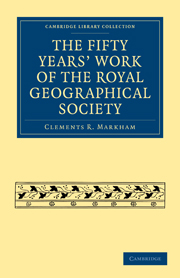Book contents
- Frontmatter
- Contents
- CHAPTER I THE FATHERS OF ENGLISH GEOGRAPHY
- CHAPTER II THE ROYAL SOCIETY
- CHAPTER III THE AFRICAN ASSOCIATION
- CHAPTER IV THE RALEIGH CLUB
- CHAPTER V FOUNDATION OF THE ROYAL GEOGRAPHICAL SOCIETY
- CHAPTER VI PRESIDENTS AND SECRETERIES OF THE ROYAL GEOGRAPHICAL SOCIETY, 1830–50
- CHAPTER VII PRESIDENTS AND SECRETARIES OF THE ROYAL GEOGRAPHICAL SOCIETY, 1851 TO 1881
- CHAPTER VIII EXPEDITIONS PROMOTED BY THE ROYAL GEOGRAPHICAL SOCIETY, AND GRANTS OF THE ROYAL AWARDS, 1830–55
- CHAPTER IX EXPEDITIONS PROMOTED BY THE ROYAL GEOGRAPHICAL SOCIETY AND GRANTS OF THE ROYAL AWARDS, 1855–1880
- CHAPTER X PUBLICATIONS OF THE SOCIETY—LIBRARY AND MAP ROOM—EDUCATIONAL MEASURES
- CHAPTER XI PROGRESS OF THE SOCIETY
- CHAPTER XII COMPARATIVE VIEW OF GEOGRAPHICAL KNOWLEDGE IN 1830 AND 1880, WITH A NOTICE OF THE WORK THAT STILL REMAINS TO BE DONE
- APPENDIX
CHAPTER VIII - EXPEDITIONS PROMOTED BY THE ROYAL GEOGRAPHICAL SOCIETY, AND GRANTS OF THE ROYAL AWARDS, 1830–55
Published online by Cambridge University Press: 29 August 2010
- Frontmatter
- Contents
- CHAPTER I THE FATHERS OF ENGLISH GEOGRAPHY
- CHAPTER II THE ROYAL SOCIETY
- CHAPTER III THE AFRICAN ASSOCIATION
- CHAPTER IV THE RALEIGH CLUB
- CHAPTER V FOUNDATION OF THE ROYAL GEOGRAPHICAL SOCIETY
- CHAPTER VI PRESIDENTS AND SECRETERIES OF THE ROYAL GEOGRAPHICAL SOCIETY, 1830–50
- CHAPTER VII PRESIDENTS AND SECRETARIES OF THE ROYAL GEOGRAPHICAL SOCIETY, 1851 TO 1881
- CHAPTER VIII EXPEDITIONS PROMOTED BY THE ROYAL GEOGRAPHICAL SOCIETY, AND GRANTS OF THE ROYAL AWARDS, 1830–55
- CHAPTER IX EXPEDITIONS PROMOTED BY THE ROYAL GEOGRAPHICAL SOCIETY AND GRANTS OF THE ROYAL AWARDS, 1855–1880
- CHAPTER X PUBLICATIONS OF THE SOCIETY—LIBRARY AND MAP ROOM—EDUCATIONAL MEASURES
- CHAPTER XI PROGRESS OF THE SOCIETY
- CHAPTER XII COMPARATIVE VIEW OF GEOGRAPHICAL KNOWLEDGE IN 1830 AND 1880, WITH A NOTICE OF THE WORK THAT STILL REMAINS TO BE DONE
- APPENDIX
Summary
The measures adopted by the Royal Geographical Society for promoting and encouraging discovery and research have been of four kinds. Awards have been presented to eminent explorers and geographers, in the form of gold medals, grants of money, gold watches, or instruments. Aid has been given to travellers. The Government has been urged, by the Council, to undertake important discoveries by the despatch of expeditions; and, on very rare occasions, the Society has itself undertaken the despatch and conduct of an expedition.
The Royal Award of 50 guineas was, during the reign of King William, presented in money or as a single medal. Such recognitions have always been highly valued by discoverers and surveyors, and have formed a strong incentive to exertion. They were not wholly wanting in former days, and even, in the dawn of English geography, the Sovereign bestowed honorable decorations on those who nobly and successfully strove to increase our knowledge of the earth's surface by land and sea. Queen Elizabeth presented to Sir Humphrey Gilbert a jewel consisting of a small anchor of beaten gold with a large pearl on the peak, which he evermore wore on his breast. Sir Francis Drake received a medal suspended from his neck by a ribband. The Royal Society granted its Copley Medal to geographers on five occasions. Captain Cook received it in 1776, and a medal was also specially struck in his honour.
- Type
- Chapter
- Information
- The Fifty Years' Work of the Royal Geographical Society , pp. 57 - 68Publisher: Cambridge University PressPrint publication year: 2009First published in: 1881



